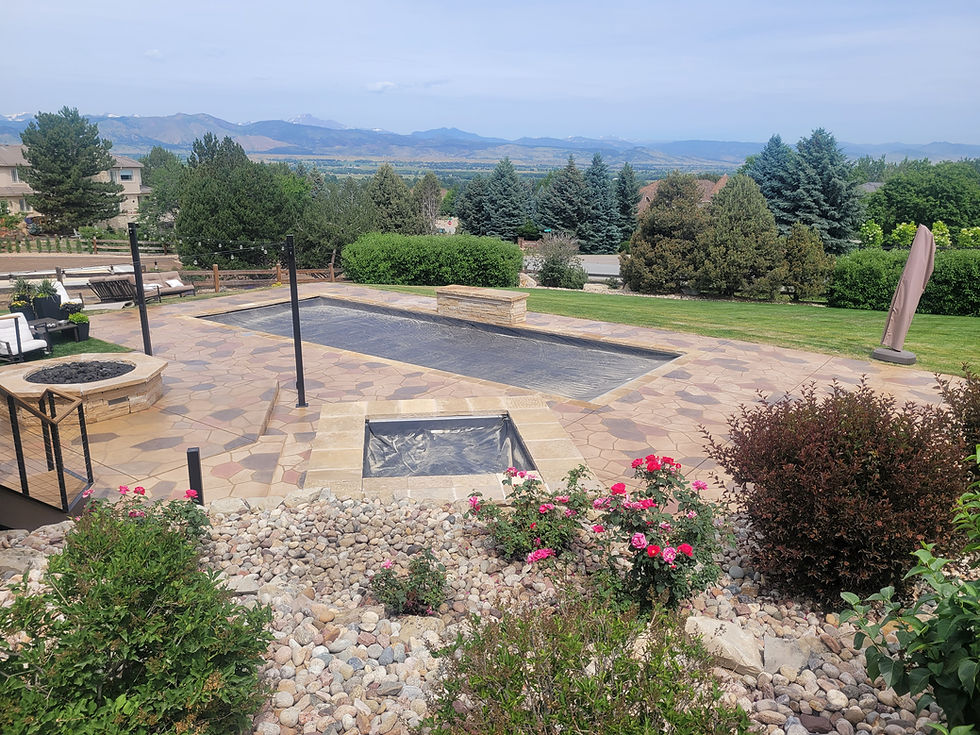Why you should not use water based sealer
- Damian Bagby
- Jun 6, 2025
- 2 min read
Why You Shouldn’t Use Water-Based Sealer Outdoors (And What to Do If You Already Did)
If you're looking to protect your stamped or decorative concrete, choosing the right sealer matters more than most people realize. One of the biggest mistakes we see homeowners make is using a water-based concrete sealer on outdoor surfaces. While it might seem like a safe or eco-friendly option, water-based sealers often don’t hold up in Colorado’s climate.
Here’s why we recommend staying away from them—and what to do if your concrete already has one applied.
The Problem With Water-Based Sealers Outside
Water-based sealers might work well indoors or in mild climates, but they struggle in outdoor environments, especially in places like Colorado where the weather swings hard between freezing winters and hot, sunny summers. Here's why:
Poor Durability: Water-based sealers don’t penetrate the concrete deeply. They sit on the surface and can wear away quickly with sun exposure and freeze/thaw cycles.
Peeling & Flaking: As they break down, they often start peeling or flaking, especially on stamped concrete. This not only looks bad, but it creates an uneven surface that can be hard to fix.
No Chemical Bond: Water-based sealers don’t bond well to solvent-based products, which limits your future options.
How to Tell if You Have a Water-Based Sealer
Not sure what kind of sealer is on your concrete? Here’s a simple test you can do at home:
Pour some Xylene (available at most hardware stores) on a small, inconspicuous area.
Let it sit for 30 seconds and then rub the area with a rag.
If the sealer gets sticky or starts to dissolve, it's likely a solvent-based sealer.
If nothing happens, you’re probably dealing with a water-based sealer.
What to Do If You Already Have a Water-Based Sealer
If your concrete already has a water-based sealer, don’t panic—there are options:
Let it fully wear off: This is the easiest and safest route. Water-based sealers tend to wear out within a couple of years. Once it's gone, we can properly reseal it with a high-quality solvent-based acrylic sealer.
Sandblast Removal: If you want to speed things up, we offer sandblasting services to remove old water-based sealer and prep the surface for a fresh, long-lasting finish.
Do Not Apply a Solvent-Based Sealer Over It: Solvent-based sealers will not adhere properly to water-based coatings and will likely cause hazing, peeling, or other issues.
The Better Option: Solvent-Based Acrylic Sealer
At Concrete Sealers, we only use solvent-based acrylic sealers because they offer:
Stronger protection
Deeper color enhancement
Better bonding and durability
Resistance to UV rays and freeze/thaw cycles
If your concrete looks dull, cloudy, or flaky, give us a call—we’ll help you figure out what’s on your concrete and what your best next step is.
Final Thoughts
Don’t waste time or money on products that aren’t built for Colorado weather. If you're unsure what sealer you have or how to fix a previous job, we're here to help. One quick test or consultation can save you a lot of hassle down the line.



Comments